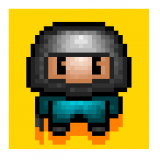@believer258: I don't know how to explain it in any way I haven't already done, but I'll try to rephrase, so sorry - this'll be a long one.
Basically I've seen a lot of chatter lately on the internet lately, debates flaring up in one place or another about what games are, whether they're art, by extension what art itself is, and what it means to be indie.
Inevitably what'll happen is that someone will say (and I'm simplifying here) something along the lines of:
"Well, I think a sensible way to define indie is this: blah blah blah. Based on that definition, X and Y count, but Z doesn't count, which seems about right to me."
And then without fail there will be replies which say 'what about A, B and C?' And then someone else will suggest their own definition or a modification to the definition and the conversation will go on.
On the one hand this might be seen as healthy debate about the state of the medium or whatever, but it seems to me that debating definitions is a very over-simplistic way of doing that. It's like the discourse is wasting a lot of time arguing over what box various things go in that they don't get into any depth about the thing itself. Like, I was listening to a podcast segment on Proteus recently and they spent several minutes arguing about whether it was a game or not and while some interesting points were made about the nature of play, the actual thing they were talking about, Proteus, kind of got shoved aside in service of this meta-discussion. That's what I think definition-debates do, most of the time: distract from deeper analysis.
As for tables and games, I acknowledged in the original blog that they're different things in some important ways. I said: "You might rightly point out that while there's no disagreement over what a table is, there's plenty of debate over art, indie and games. And that's true - at the moment there are different schools of thought on what counts as these things. That's because they're quite complex, abstract concepts unlike that of a table which is an easy enough pattern to recognise even if I can't put it exhaustively into words."
I'm aware that the concept of a table is different from the concept of a game in lots ways. But I was using it as an example of how we approach language in daily life: we don't know what words mean because we know their definition, rather we know what words mean because we recognise and understand how they fit a pattern. The nature of the pattern is something that can be debated (and that's very likely to happen with an abstract concept like games, unlike a concrete one like tables) but attempting to settle the debate by trying to conjure an exhaustive definition usually just ends up with the same kind of nit-picking that I emulated with my table example. Except instead of 'what about a bird table?' or 'what about a snooker table?' it's 'what about this game?' or 'what about this studio?' There'll always be some section of things someone intuitively wants to call art/indie/game that nevertheless manages to fall outside any given strict definition. Seems to me the best solution is to embrace the inherent fuzziness of meanings and move on.
So, finally, and as an example, I think one way of talking about, say, Proteus is having a discussion about whether it's a game or not by trying to pin down what a game is and then seeing if Proteus fits that. But I think this is likely to devolve into nit-picking if the discussion is framed that way. I think a more interesting and productive way to talk about Proteus would be to talk about Proteus. So, for example, one could discuss what motivates someone playing Proteus to explore, and how that's different or similar to other games (or whatever you want to call them). It might not get us any closer to knowing which box to put Proteus in, but we at least might discover something interesting about the nature of play that we wouldn't get to while hung up about which definition it fits. (which, to me, seems like a far more trivial discussion. Even if it was definitively settled, Proteus forever more is/isn't a game... what now? What have we learned from that?)

Log in to comment